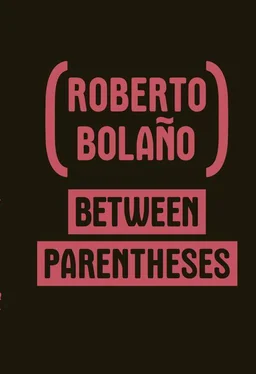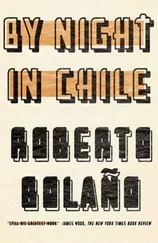Roberto Bolaño - Between Parentheses - Essays, Articles and Speeches, 1998-2003
Здесь есть возможность читать онлайн «Roberto Bolaño - Between Parentheses - Essays, Articles and Speeches, 1998-2003» весь текст электронной книги совершенно бесплатно (целиком полную версию без сокращений). В некоторых случаях можно слушать аудио, скачать через торрент в формате fb2 и присутствует краткое содержание. Год выпуска: 2011, Издательство: New Directions, Жанр: Публицистика, Критика, на английском языке. Описание произведения, (предисловие) а так же отзывы посетителей доступны на портале библиотеки ЛибКат.
- Название:Between Parentheses: Essays, Articles and Speeches, 1998-2003
- Автор:
- Издательство:New Directions
- Жанр:
- Год:2011
- ISBN:нет данных
- Рейтинг книги:4 / 5. Голосов: 1
-
Избранное:Добавить в избранное
- Отзывы:
-
Ваша оценка:
- 80
- 1
- 2
- 3
- 4
- 5
Between Parentheses: Essays, Articles and Speeches, 1998-2003: краткое содержание, описание и аннотация
Предлагаем к чтению аннотацию, описание, краткое содержание или предисловие (зависит от того, что написал сам автор книги «Between Parentheses: Essays, Articles and Speeches, 1998-2003»). Если вы не нашли необходимую информацию о книге — напишите в комментариях, мы постараемся отыскать её.
The Savage Detectives
Between Parenthese
Between Parentheses: Essays, Articles and Speeches, 1998-2003 — читать онлайн бесплатно полную книгу (весь текст) целиком
Ниже представлен текст книги, разбитый по страницам. Система сохранения места последней прочитанной страницы, позволяет с удобством читать онлайн бесплатно книгу «Between Parentheses: Essays, Articles and Speeches, 1998-2003», без необходимости каждый раз заново искать на чём Вы остановились. Поставьте закладку, и сможете в любой момент перейти на страницу, на которой закончили чтение.
Интервал:
Закладка:
II. (MAY 1999–JULY 2001)
AN AFTERNOON WITH HUIDOBRO AND PARRA
Soon it will be two years since my friend Marcial Cortés-Monroy brought me to Las Cruces, where we had lunch and spent the afternoon with Nicanor Parra. The author of Poems and Antipoems , originally published in 1954, has a house there on a steep hillside from which one can gaze out at the vast sea and also at the grave of Vicente Huidobro, on the other side of the bay. Actually, to see Huidobro’s grave from Parra’s wooden terrace, it helps to have binoculars, but even without them the grave of the author of Altazor is fully visible or at least as visible as Huidobro would have wanted.
Do you see that forest? asks Parra. Yes, I do. Which one? asks Parra, who not for nothing used to be a teacher. The one up above or down below? The one on the left or on the right? I see them all, I say, as I stare out at a vaguely lunar landscape. All right, look at the forest on the left, says Parra. Beneath it there’s a kind of road. Like a line, but it’s not a line, it’s a road. See it? Now look up and you’ll see the forest. He’s right: I see a scratch that must be the highway or a country road, and I also see the forest. In the upper part of the forest there’s a white spot, says Parra. It’s true: the forest, seen from his terrace, is a dark green color, almost black, its uniformity broken by a white spot near the top edge. I see the spot, I say. That’s Huidobro’s grave, says Parra, and he turns and goes back into the living room. Marcial follows him and for an instant I’m left there alone as a gust of wind blows up from the beach, staring at the tiny white spot where the bones of Vicente Huidobro lie rotting.
Then I feel something tug at my pants leg. Huidobro’s ghost? No, it’s Parra’s cats, six or seven stray cats that come every afternoon to the yard of the greatest living poet in the Spanish language to be fed. Like me, basically.
LICHTENBERG IN THE FACE OF DEATH
Lichtenberg is our philosopher. Sometimes it’s tempting to say that he’s our only philosopher, but there’s also Pascal, who died of pancreatitis, and Diogenes, who was a first-class joker. And yet we (and frankly, when I say “we,” I don’t know what I’m talking about) find consolation in Lichtenberg, in his mirrors, in his mood swings, in his doubts and in his tastes, which sometimes amount to the same thing.
A little more than two hundred years ago the sage of the venerable city of Göttingen wrote the following: “On the night of February 9, 1799, I dreamed that while on a journey I was eating at an inn, or rather a roadside shack, where they were playing dice. Sitting across from me was a fresh-faced young man who seemed a bit dissipated and who, without paying any attention to the people around him, whether seated or standing, was eating his soup; nonetheless, he tossed every second or third spoonful into the air, caught it again in his spoon, and swallowed it calmly. What I find so singular about this dream is that it inspired my habitual remark: that such things cannot be invented, only seen (by which I mean that no novelist would ever have come up with the idea); and yet I had just invented it myself. At the table where they were playing dice, a tall, thin woman sat knitting. I asked her what could be won at this game, and she answered: Nothing! When I asked her whether anything could be lost, she said: No! The game struck me as very important.”
This passage — must it be said? — foreshadows Kafka and much of twentieth-century literature. It also sums up the Enlightenment, and upon it a culture could be founded. It anticipates the philosopher’s own death, on February 24 or fourteen days after the dream, as if death had paid Lichtenberg a visit two weeks before their final encounter. And how does our philosopher respond when visited by the withered old crone? He responds with humor and curiosity, the two most important components of intelligence.
SERGIO PITOL
For a few months now, Tríptico del Carnaval [Carnival Triptych] (Anagrama), a three-volume set by the enigmatic and often unclassifiable Mexican writer Sergio Pitol, has been in bookstores. Why enigmatic? Because Pitol — unlike Carlos Fuentes and others writers of his generation who enjoyed the fruits of the Boom — always held himself a little apart, whether in terms of his work, unsurpassed in Mexico and on a par with that of a select few in the Spanish language, or his reading habits: one mustn’t forget that we owe Pitol the translation of a memorable novel by Jerzy Andrzejewski, The Gates of Paradise , and his always astute readings of Witold Gombrowicz.
His remoteness, punctuated by multiple trips and global wanderings, or his presence, suddenly revealed to us as absence, has yielded a figure that, while admired by the few of us fortunate enough to boast of a close acquaintance with his work, is at the same time unfamiliar to most, a giant shadow acknowledged to possess certain merits but avoided like a hedgehog in the middle of the road. And yet, in my opinion Pito is superior to Salvador Elizondo or García Ponce, for example, two Mexican novelists who also scarcely register on most people’s lists.
Tríptico del Carnaval comprises El desfile del amor [The Parade of Love] (awarded the Premio Herralde in 1984), a vast Mexican labyrinth that continually reconstructs itself as a crime novel and as historic impossibility; Domar a la divina garza [Taming the Sacred Heron] , a glimpse of hell and a display of the Pitolian sense of humor; and La vida conyugal [Conjugal Life], a reflection on reality and writing that’s also not lacking in humor — like all of Pitol’s work, incidentally.
It goes without saying but it must be said: Pitol, who is now sixty-six, continues to be a rebel and a brave man.
THE INCREDIBLE CÉSAR AIRA
If there’s currently a writer who defies all classification that writer is César Aira, from Coronel Pringles, Argentina, a city in the province of Buenos Aires that I have no choice but to accept as real, though it sounds invented by Aira, its most illustrious son, an exceptionally perceptive chronicler of mothers (a verbal mystery) and fathers (a geometric certainty), and a man whose position in contemporary literature in Spanish is as complicated as the position of Macedonio Fernández was at the turn of the century.
To begin with, it must be said that Aira has written one of the five best stories I can remember. It’s called “Cecil Taylor” and it’s collected in an anthology of Argentine literature edited by Juan Forn. Aira is also the author of four memorable novels: How I Became A Nun , which tells the story of his childhood; Ema, la cautiva [Emma the Captive], which describes the luxury of the Indians of the pampa; The Literary Conference , which recounts an attempt to clone Carlos Fuentes; and El llanto [The Weeping], which retails a kind of epiphany or insomnia.
Of course, these aren’t his only novels. I’m told that Aira writes no fewer than two books a year, books that are sometimes published by the small Argentine publishing house Beatriz Viterbo, named after the Borges character in “The Aleph.” The few books that I’ve been able to find were published by Mondadori and Tusquets Argentina. It’s too bad, because once you’ve read Aira, you don’t want to stop. His novels are like stagings of Gombrowicz’s theories, with one fundamental difference: the Pole was the abbot of some plush imaginary monastery, whereas Aira is a nun or novice of the Discalced Sisters of the Word. Sometimes he’s reminiscent of Roussel (a Roussel on his knees in the red tub), but the only contemporary writer to whom he can be compared is the Barcelonan Enrique Vila-Matas.
Читать дальшеИнтервал:
Закладка:
Похожие книги на «Between Parentheses: Essays, Articles and Speeches, 1998-2003»
Представляем Вашему вниманию похожие книги на «Between Parentheses: Essays, Articles and Speeches, 1998-2003» списком для выбора. Мы отобрали схожую по названию и смыслу литературу в надежде предоставить читателям больше вариантов отыскать новые, интересные, ещё непрочитанные произведения.
Обсуждение, отзывы о книге «Between Parentheses: Essays, Articles and Speeches, 1998-2003» и просто собственные мнения читателей. Оставьте ваши комментарии, напишите, что Вы думаете о произведении, его смысле или главных героях. Укажите что конкретно понравилось, а что нет, и почему Вы так считаете.












